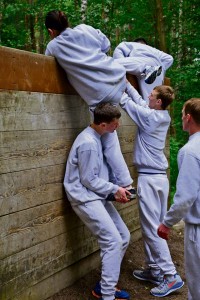
GRAFENWÖHR, Germany — An alarm rings. A teenage boy sits up in bed, peels his eyes open and looks wearily at the clock realizing he has slept longer than expected. He grabs his Air Force sweatshirt and sweatpants, dresses quickly and scrambles out the door.
The other 65 high school students from around Europe are already formed up on the drill pad. One of this boy’s class leaders asks why he showed up late. His response is unacceptable and he is asked to report back after the formation. This is the beginning of a transformation for this group of young adults — the Air Force Junior Reserve Officers’ Training Corps summer program has begun.
These high school students, ranging from 15 to 17 years old, took part in the European AFJROTC summer program here from June 23 to 29.
They were given academic instruction on leadership and team building, given basics in military customs and courtesies and drill and ceremony, and were run through several physically and mentally demanding courses designed to build their confidence, help them face their fears, test their abilities and work together as a team.
According to its website, the JROTC’s objectives are to educate and train high school cadets in citizenship, promote community service, instill responsibility, character, and self-discipline, and provide instruction in air and space fundamentals.
“Our mission (in AFJROTC) is developing citizens of character dedicated to serving their nation and community,” said retired Lt. Col. Robert Meyer, director of the AFJROTC program at Kaiserslautern High School. “Naturally we attract many students who are interested in serving (the military), and we encourage and support that, but (most) students don’t join the military.”
He said on average about 5 percent of JROTC cadets go on to join the military, however, despite such low numbers there is still a lot that they can learn from the program.
“I think the biggest thing … is (seeing) that these young people are preparing themselves in a serious way to be better citizens and leaders for our nation — ready to serve in various capacities — not just the military,” Meyer said.
He said the decision to move the camp to Grafenwöhr was to take advantage of the facilities and physical courses offered there. There’s a ropes course to test students agility, a leadership reaction course to help build teamwork, problem solving and leadership, and a military confidence course to test the cadets both physically and mentally.
Not only was this a change in scenery for the camp but this was the first time they implemented the redesigned program.
Retired Col. Mark Fry, the European summer camp commander, said this new style was developed to let the students lead each other and have the field training officers there for advice when needed.
“We are implementing a new form of leadership style this year to develop the students rather than have the FTOs lead. The FTOs are there to advise and vector rather than direct,” Fry said.
This new program is giving the teenagers a chance to develop and grow, Meyer said.
“We are training these young leaders to lead,” he said.
Senior Master Sgt. Gillie Zamora, 693rd Intelligence, Surveillance and Reconnaissance Group and an FTO during the camp, said his experience with the children was different from what he expected.
“Each child brought a different complex problem … I got to hone and develop my leadership skills by using different mentoring tactics,” Zamora said.
One of the participants agreed that this was a unique opportunity, and one she had experienced in more than three years of JROTC.
“This camp not only brought something different with the hands-on training but it also helped us build our character,” said Katherine Zamora, cadet commander and daughter of Sergeant Zamora. “(The student leaders) were given the opportunity to lead the group, which helped us build our own character and kept us motivating each other. This was a whole new experience for me that I will be able to use for the rest of my life.”







